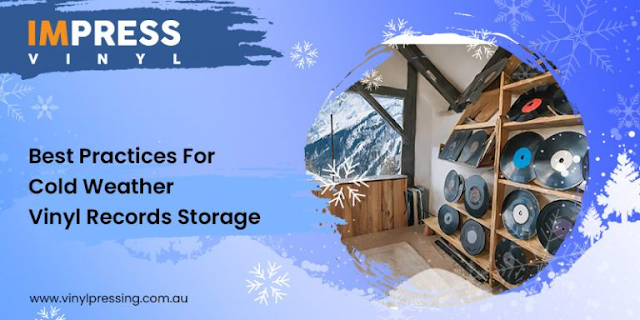Effects of Storing Vinyl Records In Cold Temperature
Vinyl records are cherished for their warm, analog sound and timeless appeal, captivating music enthusiasts with their nostalgic charm. However, ensuring the longevity and quality of vinyl records requires proper care and storage. While many vinyl collectors are aware of the dangers of storing records in extreme heat or direct sunlight, the impact of cold temperatures on vinyl records is often overlooked. In this blog, we'll explore the effects of storing vinyl records in cold temperatures and how to mitigate potential damage to your cherished collection.
Understanding the Effects of Cold Temperatures on Vinyl Records: Vinyl records are made from a combination of PVC (polyvinyl chloride) and other additives, which give them their unique sound and durability. However, vinyl becomes more brittle and prone to damage in cold temperatures. When exposed to freezing temperatures, vinyl records can become stiff and brittle, making them susceptible to cracking, warping, and surface damage. Additionally, extreme cold can cause the adhesive used in record jackets and sleeves to deteriorate, leading to separation and damage to the artwork and liner notes.
Risks of Freezing and Thawing: Rapid changes in temperature, such as freezing and thawing, pose significant risks to vinyl records. When vinyl records are exposed to freezing temperatures, the contraction of the vinyl material can cause warping and distortion of the record surface. Thawing can further exacerbate these issues, as the vinyl material may expand unevenly, leading to permanent damage and degradation of sound quality. Additionally, condensation can form on the surface of records during thawing, increasing the risk of mold and mildew growth.
Proper Storage Techniques: To protect your vinyl records from the damaging effects of cold temperatures, it's essential to store them properly in a controlled environment. Ideally, vinyl records should be stored at room temperature, between 65-70 degrees Fahrenheit (18-21 degrees Celsius), with relative humidity levels between 40-50%. Avoid storing records in basements, attics, or other areas prone to temperature fluctuations, as these environments can expose records to extreme cold and humidity levels. Instead, opt for a climate-controlled storage space or dedicated record storage unit to ensure consistent temperature and humidity levels.
Insulating Records During Transportation: When transporting vinyl records in cold weather, it's crucial to take precautions to insulate them from extreme temperatures. Use protective packaging such as record mailers or padded envelopes to shield records from the cold during transit. Additionally, consider adding insulation such as bubble wrap or foam padding inside the packaging to provide an extra layer of protection against temperature fluctuations. Avoid leaving records in vehicles or exposed to the elements for extended periods, as this can increase the risk of damage from cold temperatures.
Gradual Temperature Changes: When moving vinyl records between temperature extremes, such as from a cold outdoor environment to a warm indoor space, it's essential to allow for gradual temperature changes to minimize stress on the records. Avoid exposing records to sudden temperature shifts, as this can cause rapid expansion and contraction of the vinyl material, leading to warping and damage. Instead, allow records to acclimate to the new environment slowly by bringing them indoors and allowing them to reach room temperature before handling or playing them.
Conclusion: While vinyl records are prized for their durability and longevity, storing them in cold temperatures can pose significant risks to their condition and sound quality. Understanding the effects of cold temperatures on vinyl records and taking proper precautions to store and transport them can help mitigate potential damage and preserve your cherished collection for years to come. By storing vinyl records in a controlled environment, insulating them during transportation, and allowing for gradual temperature changes, you can protect your records from the harmful effects of extreme cold and ensure that they continue to bring joy and music to your life.



Comments
Post a Comment